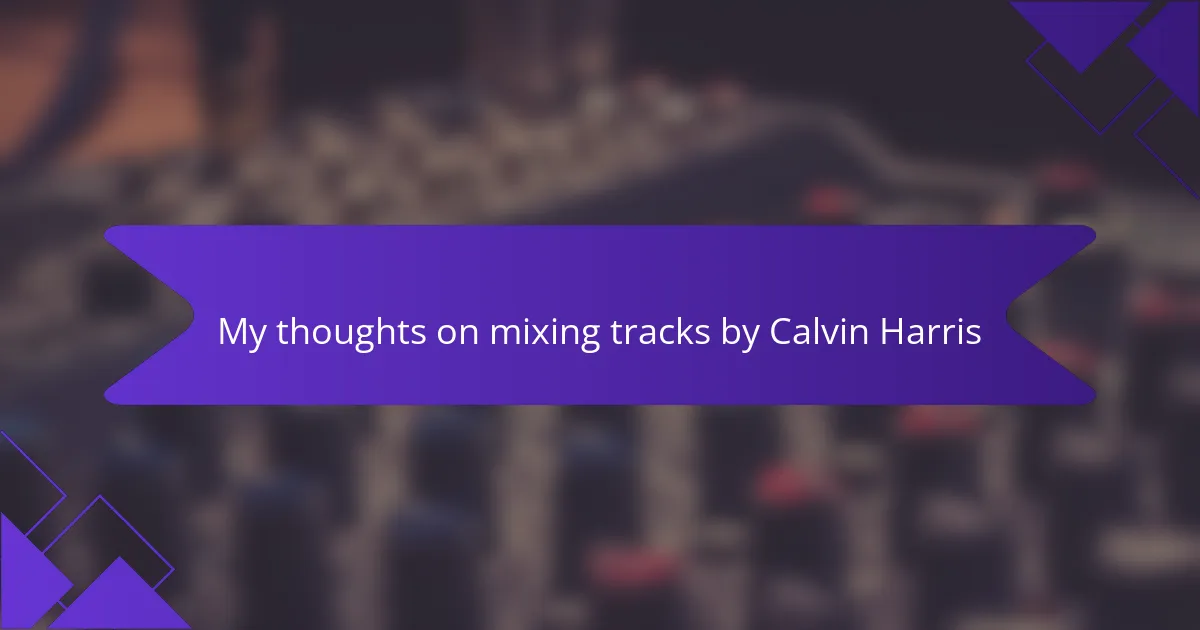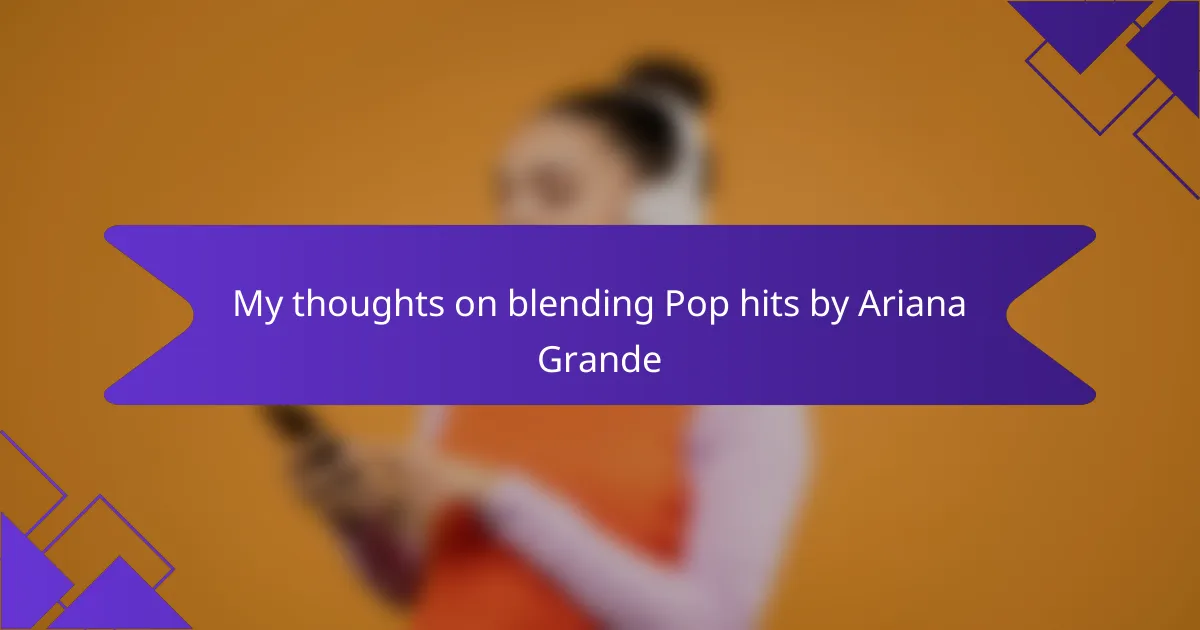Key takeaways
- Afrobeat, pioneered by Fela Kuti, merges traditional African rhythms with jazz, funk, and highlife, serving as both music and social commentary.
- Fela Kuti’s legacy includes over 50 albums and impactful lyrics that address political injustices, fostering cultural pride and awareness.
- DJs play a crucial role in sustaining the Afrobeat movement, blending classic tracks with modern sounds to create shared experiences and cultural celebrations.
- Effective mixing of Afrobeat requires a strong understanding of percussion, horn sections, and smooth transitions, enhancing the energy and connection with the audience.
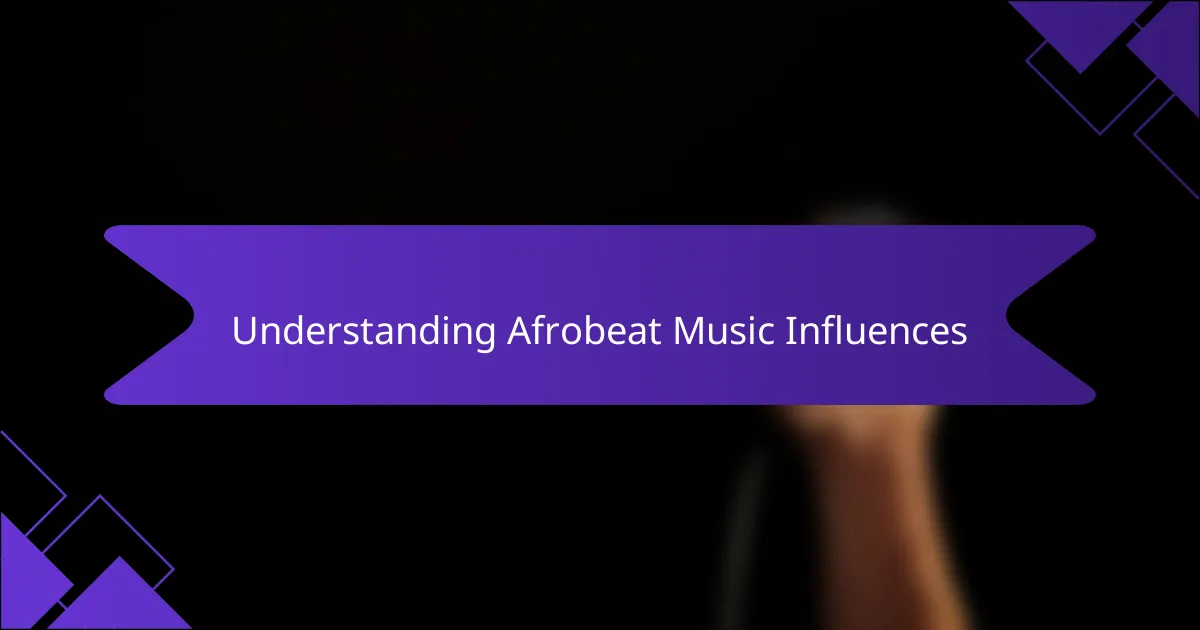
Understanding Afrobeat Music Influences
Afrobeat, a genre woven together by the legendary Fela Kuti, captures a unique blend of traditional African rhythms, jazz, funk, and highlife. I remember the first time I heard “Zombie”; it was like being transported to a lively street party in Lagos. The intricate layering of instruments and the rhythmic beats made me realize how Afrobeat isn’t just music—it’s a powerful form of expression and social commentary.
Kuti’s influence stretched beyond just the sound. His lyrics often addressed political and social issues, making listeners feel the urgency in his message. I find it fascinating how these themes resonate with audiences today, connecting generations through shared struggles while celebrating the rich cultural heritage of Africa.
Here’s a simple comparison to illustrate the key influences on Afrobeat music:
| Element | Afrobeat |
|---|---|
| Roots | Traditional African music, especially Yoruba |
| Genres Combined | Jazz, funk, highlife, and soul |
| Instrumentation | Rich use of brass, percussion, and guitars |
| Themes | Political activism, social issues, and culture |
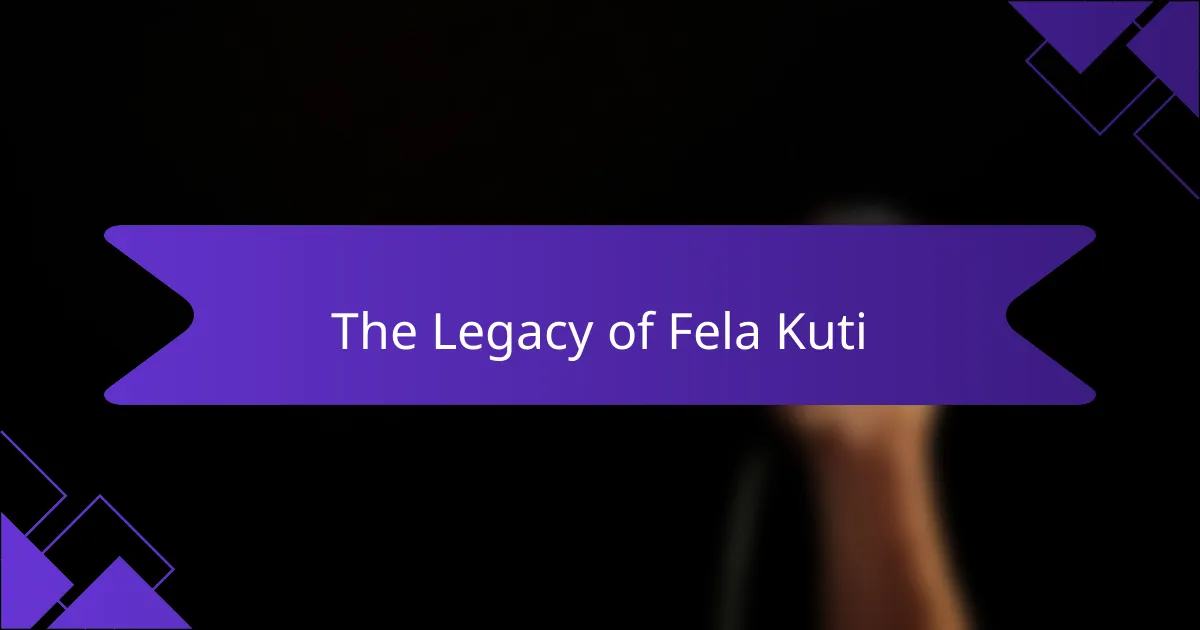
The Legacy of Fela Kuti
Fela Kuti’s influence on Afrobeat is nothing short of monumental. His revolutionary spirit was evident not just in his music but also in his social and political messages. I still remember the first time I truly listened to “Zombie.” The energy and the lyrics struck me deeply, awakening a newfound appreciation for the blend of rhythm and rebellion.
What I admire most about Fela Kuti is how he seamlessly fused traditional African rhythms with jazz and funk. This innovative style has inspired countless artists, both in Africa and beyond. I feel this incredible sense of connection when a DJ spins a Fela track. It’s more than just music; it’s a cultural movement that continues to resonate with people today.
| Key Facts about Fela Kuti | Emotional Insights |
|---|---|
| Born in 1938 in Nigeria, Fela was a pioneer of Afrobeat. | His music evokes a strong sense of pride and cultural identity. |
| He used his platform to address political injustices in Nigeria. | Listening to his songs often feels like an awakening, sparking discussions about freedom and resistance. |
| Fela released over 50 albums during his lifetime. | Each album tells a story, bringing listeners a mix of joy and reflection. |
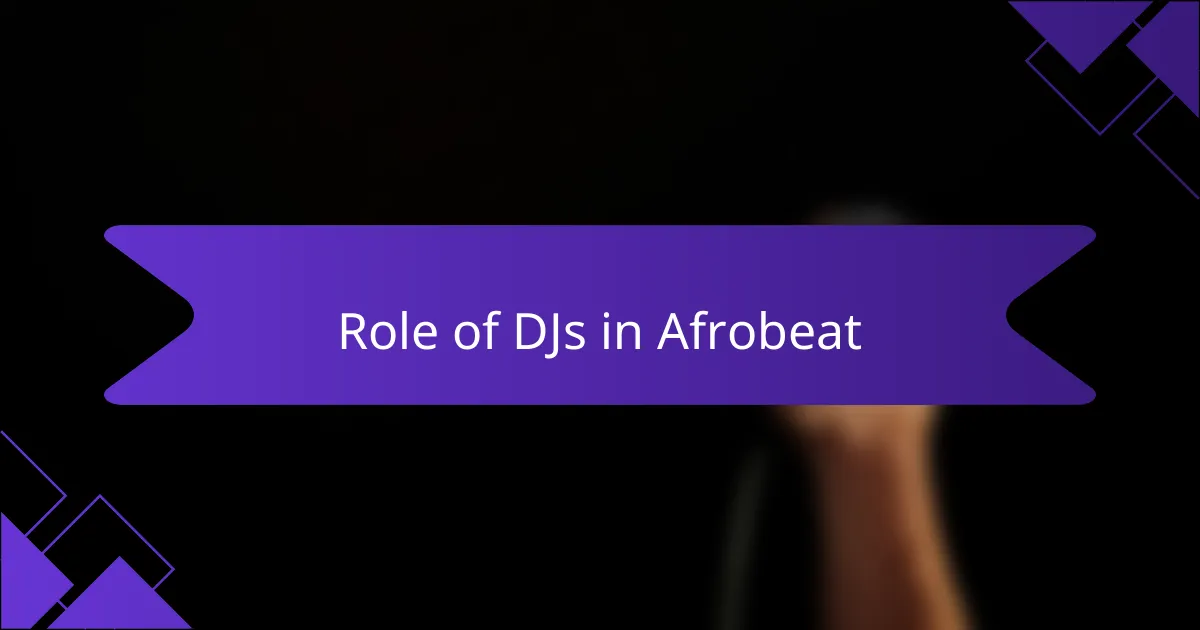
Role of DJs in Afrobeat
DJs play a vital role in the world of Afrobeat, serving as the bridges between Fela Kuti’s rich legacy and today’s vibrant music scene. I recall my first experience at an Afrobeat party when a DJ seamlessly mixed classic Fela tracks with contemporary beats. The crowd erupted with joy, proving how crucial DJs are in keeping Afrobeat alive and relevant, igniting a spark in both seasoned fans and new audiences alike.
When I listen to a DJ expertly blend Afrobeat tracks, I can’t help but feel how they curate a unique journey through sound. They don’t just play music—they elevate it, transforming dance floors into anthems of unity and celebration. Have you ever felt that moment when a familiar beat drops, and everyone around you knows just when to move? That’s the magic that DJs bring—they create shared experiences that transcend language and culture.
In my experience, a skilled DJ understands the essence of Afrobeat beyond the music itself. They weave in the cultural and historical context, reminding us of the struggles and triumphs embedded in the genre. I remember watching one DJ introduce a set with a heartfelt story about Fela’s influence before spinning tracks that made the entire room connect on a deeper level. It’s this storytelling aspect that truly brings Afrobeat to life, allowing it to resonate with listeners in profound ways.
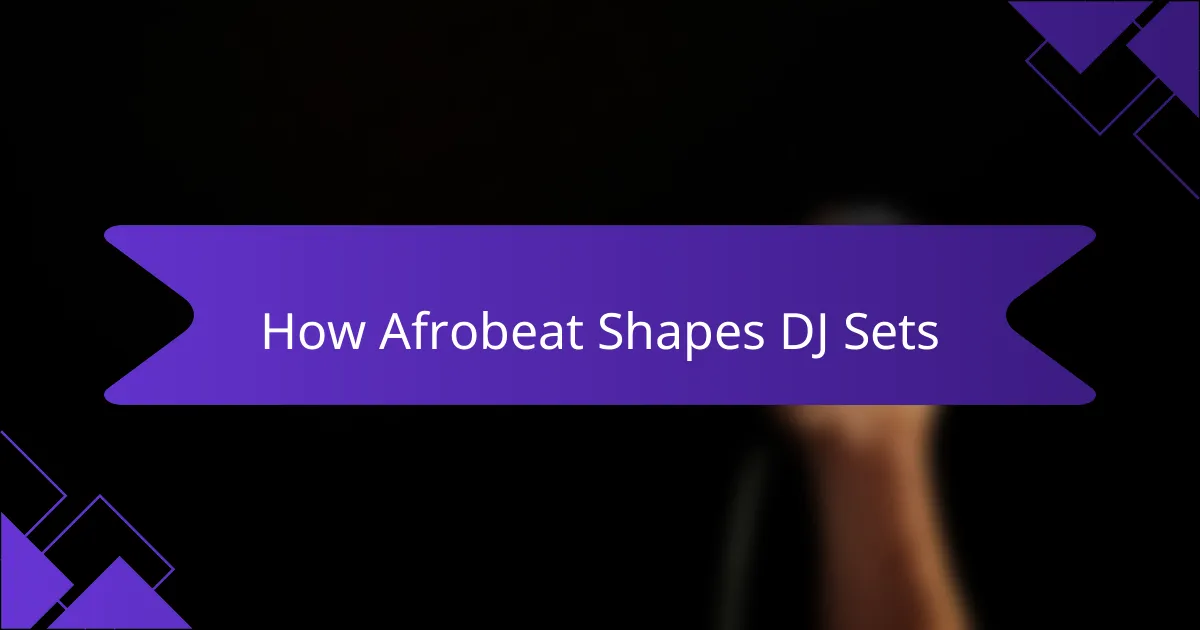
How Afrobeat Shapes DJ Sets
Afrobeat undoubtedly shapes DJ sets by infusing energy and cultural depth into performances. I remember the first time I hit the dance floor when a DJ dropped a classic Fela track mixed with modern beats. Instantly, the entire crowd transformed, united by the infectious rhythm. It was one of those moments where you realize how the right mix can elevate a party from ordinary to extraordinary.
What I love most is how DJs curate Afrobeat to tell stories. For example, I once attended a set where the DJ linked songs to historical moments in Fela’s life, creating a narrative that was both engaging and educational. It made me ponder: how often do we connect the beats to the stories they tell? In that space, I felt we were not just dancing; we were participating in a cultural celebration that echoed Fela’s legacy.
The influence of Afrobeat is evident in the way DJs blend genres and keep the vibe alive. By incorporating different elements like jazz and funk, they create a rich tapestry of sound that invites people to move and connect. Have you ever found yourself lost in a rhythm, suddenly aware of both the music and the collective heartbeat of the room? That sensation is what makes Afrobeat sets unforgettable, and it’s a testament to the power of a well-curated DJ experience.
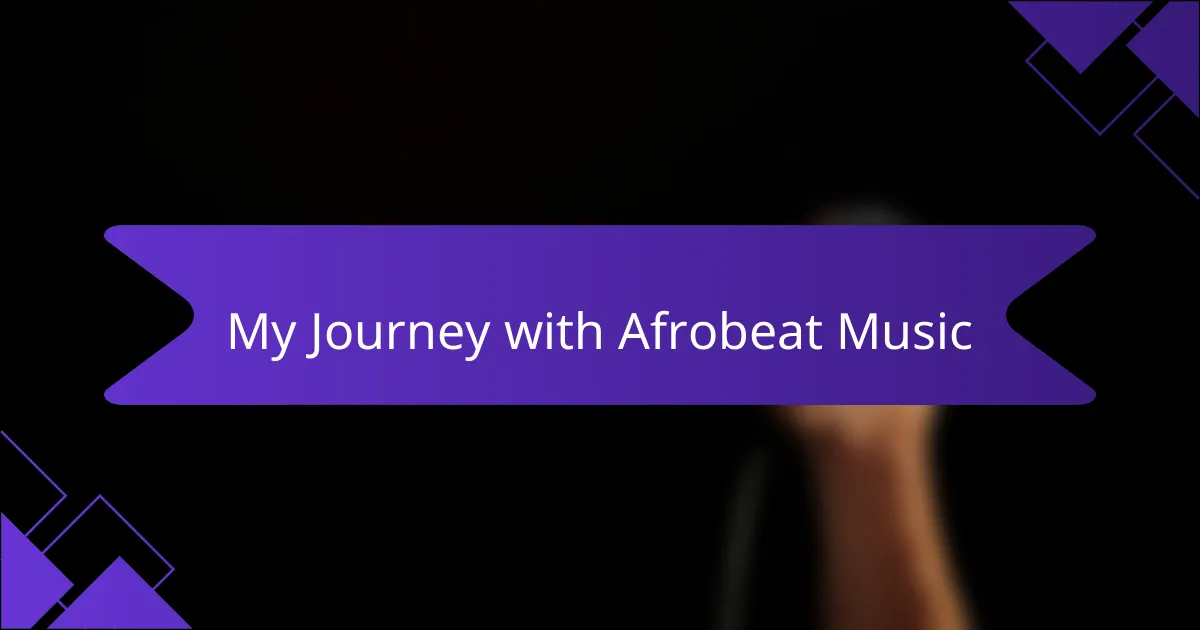
My Journey with Afrobeat Music
My journey with Afrobeat music started unexpectedly during a college party. I distinctly remember that moment when a friend played “Water No Get Enemy.” The moment those infectious horns kicked in, I felt an immediate sense of joy wash over me. It wasn’t just the rhythm; it was the essence of the music that wrapped me in an embrace of cultural richness and storytelling.
As I delved deeper, I began to understand how Afrobeat transcends just being a genre—it’s an experience. I often reflect on how Fela Kuti’s ability to convey political messages through such vibrant soundscapes impacted me. It challenges listeners to acknowledge issues while simultaneously celebrating life. Have you ever experienced music that makes you want to both dance and think? That’s what Afrobeat does for me.
I recall attending a smaller venue where a DJ devoted a night to Fela’s tracks. The atmosphere was electric, filled with people from diverse backgrounds united in movement. Each transition between songs felt intentional, a call to remember our shared history while celebrating our present. In those moments, I was reminded of the transformative power of Afrobeat—how it draws people together while pushing us to reflect on our society.
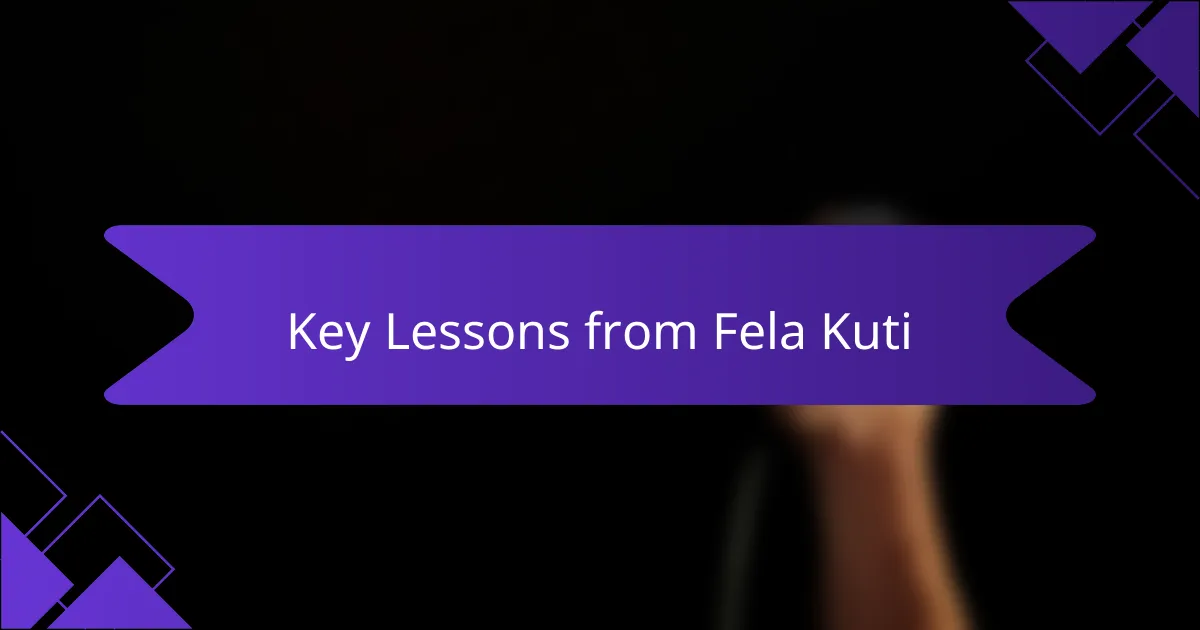
Key Lessons from Fela Kuti
Fela Kuti’s influence on Afrobeat goes beyond music; it’s a powerful testament to artistic freedom and social commentary. His fearless approach to addressing political issues resonates deeply with me, reminding me of the importance of using one’s voice for change. I recall the first time I heard “Zombie”—the raw energy and defiance left me invigorated, igniting my passion for music that speaks to the heart of societal issues.
One valuable lesson I took from Kuti is the blend of joy and resistance in his work. The infectious grooves make you want to dance, yet the lyrics challenge you to reflect on personal and collective struggles. It inspires me as a DJ to curate sets that not only get people moving but also provoke thought and connection.
Here’s a quick comparison of Fela Kuti’s key contributions to Afrobeat and what artists today can learn from him:
| Fela Kuti’s Contributions | Lessons for Today’s Artists |
|---|---|
| Socio-political commentary | Use your art to engage with important issues |
| Fusion of traditional and modern sounds | Embrace a diverse range of influences |
| Charismatic live performances | Connect with your audience emotionally |
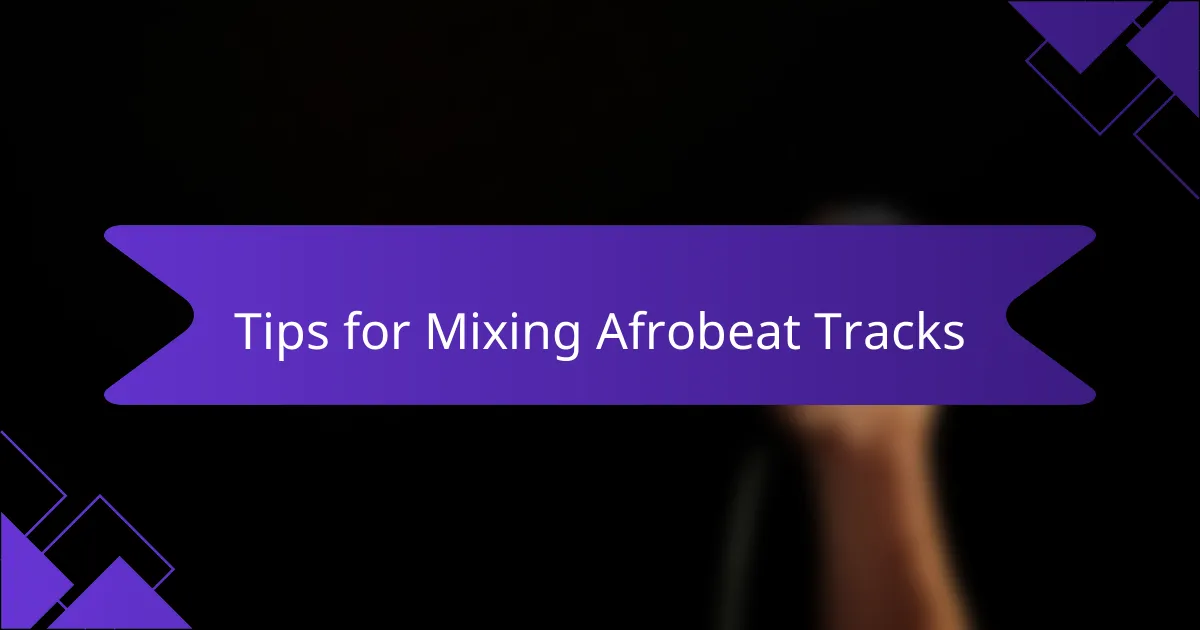
Tips for Mixing Afrobeat Tracks
Mixing Afrobeat tracks effectively requires an ear for rhythm and an understanding of its unique elements. I’ve always found that starting with the foundational percussion can set the tone for the entire mix. When I first experimented with layering traditional drums and modern beats, it transformed my DJ sets into vibrant experiences that captured the essence of Afrobeat. Have you ever felt the pulse of a well-mixed track reverberate through the crowd? That’s the power of nailing the percussion first.
Another crucial tip is to embrace the use of horn sections and synths. I remember a set where I experimented with blending a rich brass melody over a classic Fela rhythm; the energy in the room was palpable. It’s like adding a splash of color to a canvas—you want every element to pop. Mixing these distinctive motifs not only creates a fuller sound but also pays homage to Kuti’s legacy, reminding listeners of the genre’s authentic roots.
Lastly, don’t underestimate the value of transitions. I’ve learned that smooth transitions between tracks bring coherence to the energy flow of your set. One time, I connected two tracks by using a gradual filter fade; the crowd barely noticed the shift, but they felt the continuity. This connection can elevate the overall vibe, making the audience feel like they are on a shared journey rather than just listening to disconnected songs. Have you experienced that seamless blend that makes you lose track of time? That’s what great mixing achieves!

